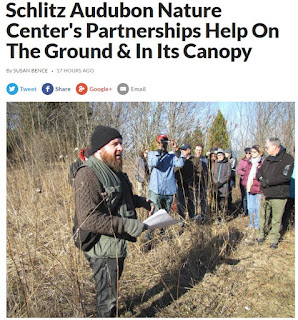Journalist Susan Bence joined us on our March 3rd tour and featured MCAP and Schlitz Audubon in her story on community partnerships, archaeology, and tree conservation. Check it out here at the WUWM website.
Thursday, May 17, 2018
Thursday, February 22, 2018
Event: March 3, 2018 "Hiking the 19th century European farmstead sties on Schlitz Audubon's Nipissing Great Lakes Terrace"
On Saturday, March 3rd, Dr. David Pacifico (Research Coordinator, Cardinal Stritch University) and Marc White (Conservation Director, Schlitz Audubon Nature Center) will lead a walking tour/hike of the central and northern portions of Schlitz Audubon’s Nipissing Great Lakes Terrace. We’ll explore in person the sites of 19th century Dutch farmsteads, which were the earliest known European settlements on the site. We’ll discuss the archaeological features on the surface as well as the potential for sub-surface European and American Indian archaeological features. This hike/tour expands on David and Marc’s January 20th lecture, though previous attendance is not required. Additional information and participation opportunities are available for free at online.stritch.edu/academics/courses under the ‘community partners’ tab. The hiking tour will meet in the Schlitz Audubon auditorium and will begin with a brief introduction on how to contribute to the research online.
Friday, January 26, 2018
Community Enthusiasm at First Public Archaeology Event
Community Enthusiasm at First Public Archaeology Event
[reblogged from online.stritch.edu/news]
On January 20th, 2018 Dr. David Pacifico and Marc White presented preliminary findings from archaeological research at Schlitz Audubon Nature Center to a crowd of 70 at the Center. David is the Research, Policy, and Assessment coordinator in Stritch's School of Continuing and Online Learning (SCOL) and Marc is the Director of Conservation at Schlitz Audubon Nature Center. This event kicks off a collaboration between SCOL, Schlitz Audubon, and David's Milwaukee Community Archaeology Project. The collaboration pushes the boundary of continuing education, online and in person events, and authentic research.
Marc reported on the ecological history of the area, which provides the context for understanding the people who once lived on the site. David presented clues about the site found in archival documents and in Wisconsin's archaeological database. Together David and Marc explained questions raised by these sources and from observations of surface features at the Center today. They presented historical map data that - with the use of Geographic Information System (GIS) technology – allowed David to estimate where these farmhouses were over 150 years ago. Their findings suggest that human activities on the land over a hundred years ago still have a profound effect on the landscape today. At least three farmstead properties were present on the site before it was turned over to the Schlitz and Uihlein families for use as a horse pasture for their brewery draft horses. Familiar invasive species on the surface today – like daylily, garlic mustard, and creeping charlie - was likely brought by these European farmsteaders from present-day Holland and Germany.
David and Marc presented new questions raised by this research, and during a Q and A session community members advanced the conversation with questions of their own – a synergy that is ideal in community based participatory research such as this. Future research workshops are being planned and there will be a tour of the Dutch homestead properties on March 3rd at 2pm. Follow along and participate through the online component at online.stritch.edu. Dr. Pacifico can be reached at dbpacifico@stritch.edu.
Subscribe to:
Posts (Atom)


